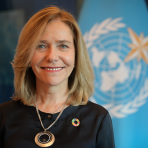Opening Remarks on the Launch of the Implementation plan of the Integrated African Strategy on Meteorology COP-29 Side event
Honorable Mike Elton Mposha (MP), MP, Minister of Green Economy and Environment of Zambia, 1st Vice Chair of AMCOMET,
Honourable Mrs. Ursula Owusu-Ekuful, Minister of Communications and Digitalization of Ghana,
Distinguished and dear colleague, Daouda Konate, 1st Vice-president of the WMO,
Excellencies Members of the AMCOMET,
Excellencies Heads of Regional Economic Communities,
Development Partners,
International and Regional Organizations,
Distinguished Permanent Representatives of Member States with WMO,
Ladies and Gentlemen,
It is a great pleasure and privilege to warmly welcome each of you to this event organized by the African Ministerial Conference on Meteorology (AMCOMET) and the African Union Commission. As we come together, the importance of our shared mission—to harness weather, water, and climate resources for socio-economic development—cannot be overstated.
First, I wish to applaud the African Union Commission to have significantly moved the AMCOMET agenda forward:
The Integrated African strategy on Meteorology (Weather, water and climate services) approved by AU Heads of States will now provide strategic guidance on meteorology related issues. And we are here today to launch its implementation and resource mobilization plan.
This is a significant step towards our common goals of closing the capacity gaps of our Members to produce reliable weather, water, climate and early warning services and to mainstream meteorology in development, planning and policy formulation by governments.
Extreme weather hits Africa hard. Heavy rainfall, flooding, landslides, drought and extreme heat negatively impacts key socio-economic sectors such as agriculture, water resources, energy and health. It exacerbates hunger, poverty and population displacement. The climate crisis is closely linked with the inequality crisis.
The 2023 State of Climate in Africa Report revealed that African countries lose on average, 2% to 5% of GDP annually and divert up to 9% of their annual budget into unplanned expenditures to respond to extreme weather events. The situation is expected to worsen in future. It has been widely demonstrated that the costs of action in the face of the impacts of climate change are much lower than the costs of inaction.
This calls for urgent climate action and adaptation.
There is tremendous potential to drive positive change and advancement across Africa if nations can harness the full benefits of weather, water, and climate information.
However, this needs significant investments throughout the value chain of the provision and delivery of accurate forecasts and warnings. The needs are particularly critical for infrastructure and human resources. These structural gaps can only be addressed by strong political support and joint collaborative efforts.
Forecasts and warnings are only as good as the data they are built upon. Unfortunately, Africa has major basic weather and climate data gaps. In order to close these data gaps, the Systematic Observations Financing Facility (SOFF) is providing support to 23 African countries with 62 million dollars of approved funding. SOFF not only provides one-time investment support, but also long-term grant financing and peer-to-peer technical assistance.
WMO also supports capacity development through its technical and training programmes and through projects funded by the Climate Risk and Early Warning Systems Initiative (CREWS). About one third of WMO’s project portfolio is dedicated to our African Members.
Through the UN Secretary General’s Early Warnings For All initiative, WMO works with partners to support Members in strengthening early warning services.
Excellencies, Partners, Ladies and Gentlemen
Investment in NMHSs makes economic sense and delivers high dividends. It is estimated that strengthening basic observations may yield additional global socioeconomic benefits of over five billion dollars annually. Other estimates indicate that investing in surface-based observations in data sparse regions yields a global benefit to cost ratio of over twenty-five. I recognize that there are many other competing priorities. But increased investment in meteorological and hydrological services is a MUST. WE must embrace innovation and technological advancements to modernize meteorological and hydrological services, enhance data collection and analysis, and deliver tailored information to end-users are essential to Africa.
Excellencies, Partners, Ladies and Gentlemen,
To achieve this, we need interdisciplinary collaboration between meteorological and hydrological services, governmental departments, research institutions, and private stakeholders.
Let us remain steadfast in our commitment to harnessing the power of meteorology and hydrology for the betterment of our societies.
Let us seize this opportunity to shape policies, forge partnerships, and lay the groundwork for a future where weather, water, and climate serve as catalytic forces for socio-economic development in Africa.
Please support the implementation and resource mobilization plan of the Integrated African Strategy on Meteorology.
Thank you for your kind attention
Statement by


